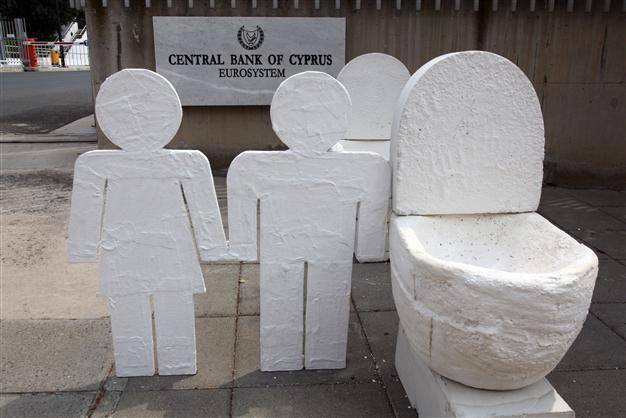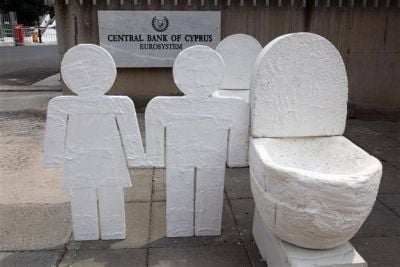
Andreas Efstathiou's artwork displayed in front of the Central Bank of Cyprus in Nicosia June 10, 2013. The Cypriot central bank has tightened conditions for Lebanese banking institutions operating on the island, pushing them, de facto, towards the exit. (Credit: AFP)
Five banking sources confirmed to L'Orient-Le Jour that the branches of Lebanese banks operating in Cyprus — BankMed, Bank of Beirut, Banque BEMO, BBAC, BLOM Bank, Lebanon and Gulf Bank (LGB), Crédit Libanais and IBL Bank — will likely have closed their doors by the end of 2022, while some have already started the process. The information was reported during the day by some media outlets, citing anonymous sources within the Central Bank of Cyprus.
Each of the eight banks mentioned operates a branch on the island.
L'Orient-Le Jour was able to confirm that BEMO Bank — via its CEO Riad Obegi, who anticipates the end of operations of its branch by the end of June and has already notified its customers — and BBAC and IBL Bank — via sources within the institutions — are on the way out.
The other five banks did not respond to L’Orient-Le Jour’s requests for comment or declined to comment.
Cypriot AstroBank, partly owned by Lebanese shareholders, and the SGBL group's subsidiary on the island, Société Générale Bank – Cyprus (“SGBCy”), which is registered as a fully autonomous Cypriot company, as well as Banque SBA — 99 percent owned by the Banque Libano-Française (BLF) group — are not affected.
Byblos Bank, which had operated a branch in Cyprus, completed the sale of its assets on the island to Astrobank last December.
Deposit guarantee
According to sources contacted, the CBC has been pushing Lebanese banks out since late 2019. Following the onset of the financial crisis in Lebanon and with the aim of avoiding its repercussions on the Cypriot banking system, the Cypriot central bank first imposed caps on the amounts that could benefit from Cyprus’ deposit guarantee scheme. This took effect in November 2019.
At the end of 2020, as Lebanon entered its second year marked by the collapse of the lira and the continuation of ad hoc restrictions on commercial bank deposits, the Cypriot institution then asked Lebanese banks operating branches on the island to transfer to special accounts registered with it an amount of cash equal to the amount needed to guarantee any deposit, with a cap of 100,000 euros per deposit.
At the time, the reports referred to a measure imposed in anticipation of possible losses suffered by Lebanese banks that could affect the branches and customers of their subsidiaries in Cyprus.
A member of the Eurozone (and whose banking policy depends on that of the European Central Bank), the island is still recovering from the financial crisis it itself experienced in 2012/2013.
“The CBC changed its mind again later, imposing that 50 percent of the deposits held by Lebanese agencies be transferred to it, in order to ensure a higher level of liquidity, exceeding 100,000 euros per deposit,” one of the sources interviewed added.
According to sources quoted by Cyprus News Agency, the above measures led to the decline of deposits in Lebanese bank branches in Cyprus from 650 million euros at the end of 2019 to 400 million euros a year later.
“At the end of February, this threshold finally rose to 105 percent of each deposit. This clearly means that the Cypriot authorities do not want us here anymore,” one of the sources said. “Banque du Liban refused this prospect and notified the Cyprus-based banks as early as March,” she added.
Another source draws a parallel between the latest CBC decision and the visit to Beirut of two international delegations between the end of February and the beginning of March: one by the International Monetary Fund, with which Lebanon is negotiating financial assistance, and another by the US Treasury, headed by Paul Arhen, the acting assistant secretary and principal deputy assistant secretary for the Office of Terrorist Financing and Financial Crimes.
In December, US Treasury Undersecretary for Terrorism and Financial Intelligence Brian Nelson, expressed the US administration’s “disappointment with the lack of anti-corruption initiatives by Lebanese banks,” even accusing them of “turning a blind eye to illicit funds from the country’s politically exposed personalities passing through the sector.”
In this context, “it is not surprising that the Cypriot banking authorities are no longer really interested in having many Lebanese bank branches operating on their territory,” concluded another of the sources interviewed by L’Orient-Le Jour.
Sources quoted by Cyprus News Agency said that the total deposits and loans held by Lebanese bank branches on the island represent less than 1 percent of the total deposits and loans held by the Cypriot banking system, the majority of which are owned by non-residents.
This article was originally published in French in L’Orient-Le Jour.
